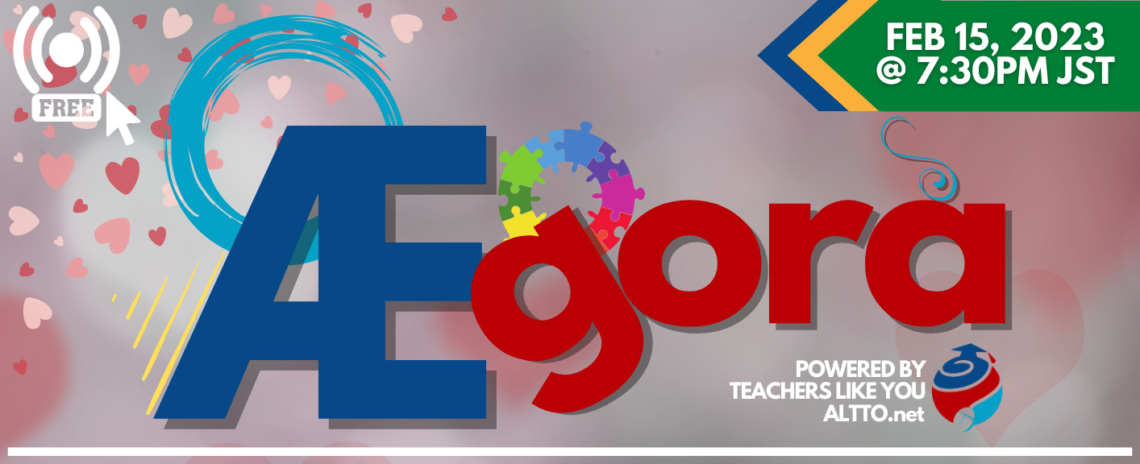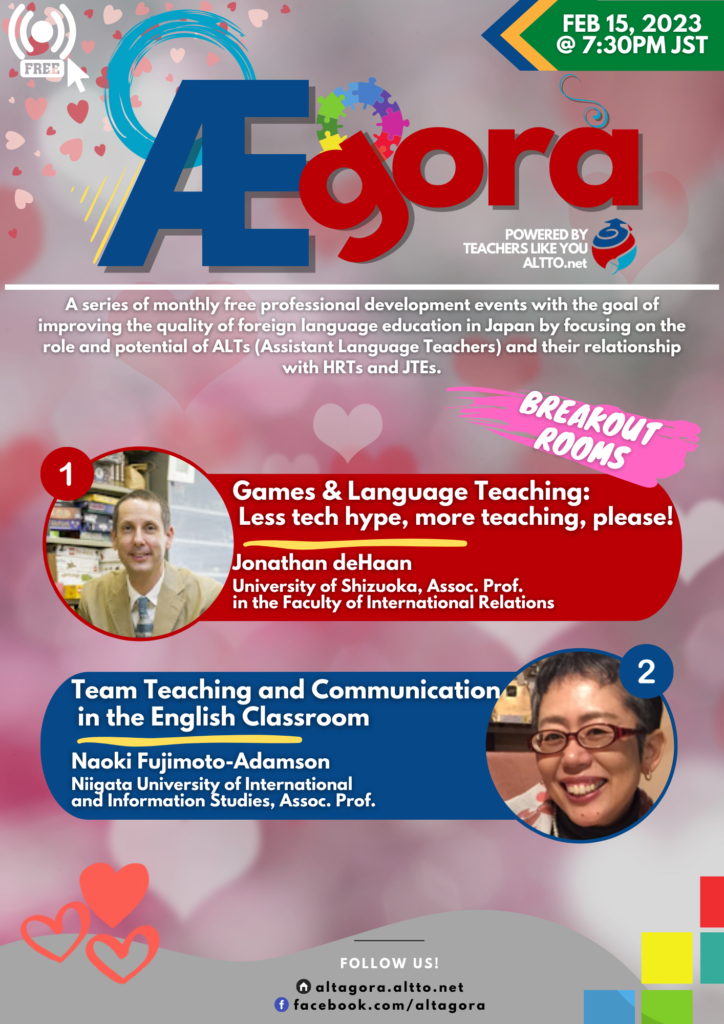
ALT Agorà – February 15, 2023 – Register Now!
February – love is in the air, and Agorà is by your side. This month, we have two fantastic topics by two fantastic speakers for you to choose from. In one room, a deep dive into integrating games into language teaching; in the other room, practical tools to improve team teaching classes by analyzing communication. Whichever you choose, you don’t want to miss this month!
When: Wednesday, February 15, 2023, @7:30 pm JST
Where: Online CLICK HERE TO REGISTER
How to join: you will receive the link the day before the event (or on the same day!).
Follow us on FB: https://facebook.com/altagora

This month, join us to talk about the following topics:
BREAKOUT ROOM 1: Games & Language Teaching: less tech hype, more teaching, please!
Speaker: Jonathan deHaan
Games (e.g., conversation games, digital games, role plays) have been used for decades in language teaching. Unfortunately, language with games research has primarily focused on technologies and motivation, and doesn’t offer much to help teachers “do more” with games in their classrooms. In this teacher-focused talk, I’ll “dive deep” on my recent teaching/research/design agenda: integrating (a wide variety of) games with a comprehensive teaching method: the Pedagogy of Multiliteracies. I will give you ideas and materials and techniques to take into your classrooms (or labs). These will vary from thinking about “big picture” questions like “why are we teaching and learning?” to different types of teaching (traditional <–> progressive and yes they both have their benefits), to specific activities (experiences, discussions, mini-research projects, participation projects, reflection), and the different things that a teacher can say and do to lead, guide, mediate, support, direct and transform learners, classrooms, and society. I’ll show you what I have been thinking and doing … and try to help you avoid the pitfalls I fell into before discovering a new way to do things with games.
BREAKOUT ROOM 2: Team Teaching and Communication in the English Classroom
Speaker: Naoki Fujimoto-Adamson
Team teaching in English classes has been widely implemented in Japan for more than 30 years since the Japan Exchange and Teaching (JET) Program was launched in 1987. Since then the advantages and challenges have been widely discussed. It is said that students are able to learn authentic English from Assistant Language Teachers (ALTs) from English speaking countries. Also, team teaching enables Japanese Teachers of English (JTEs) to improve their target language skills. However, the reality is that teachers face challenges in communicating with their classroom partners who have different cultural and linguistic backgrounds. The purpose of this talk is to offer practical tools to analyze classroom interaction to improve team teaching practices. I would like to propose three practical “hows” to analyze their communication objectively. Firstly, Kachru (1992) suggested that teaching world English(es) is necessary nowadays. What kind of English do you teach? Secondly, when we think about our relationship at the workplace, the idea of a “community of practice” (Lave & Wenger, 2019) among teachers is helpful. Let’s analyze the relationship between team teachers. Thirdly, Sinclair and Coulthard (1975) proposed a coding system to analyze our classroom talk. Hopefully, these tools will assist your teaching.
The speakers that will join us for this event are:

Jonathan deHaan
Jonathan deHaan is an associate professor in the Faculty of International Relations at the University of Shizuoka. He has been researching and teaching language and literacy with games for 20 years. He is currently exploring the boundaries of teaching language and literacy with and around games with his ongoing pet project, “The Game Terakoya.”

Naoki Fujimoto-Adamson
Naoki Fujimoto-Adamson is an associate professor at Niigata University of International and Information Studies (NUIS) in Niigata Prefecture. Currently, she teaches academic writing, test-taking skills and sociolinguistics. She has taught a wide range of students from elementary school to university. Early in her career, she worked for eight years at junior high schools in Nagano Prefecture as a Japanese teacher of English (JTE). She received her MA in English Language Teaching from the University of Essex, UK, and M.Ed. (Master of Education) in Applied Linguistics and TESOL from the University of Leicester, UK.




